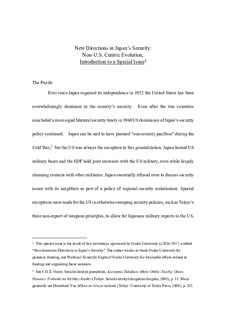New directions in Japan's security: non-US centric evolution, introduction to a special issue
Journal article
Submitted version
Permanent lenke
http://hdl.handle.net/11250/2586789Utgivelsesdato
2018Metadata
Vis full innførselSamlinger
Sammendrag
During the cold war the United States was overwhelmingly central in Japan's security policy. Japan hosted US bases and the Self-Defense Forces held joint exercises with the US military, even while shunning contacts with other militaries. Japan essentially refused even to discuss security with its neighbors. Special exceptions were made for the United States in otherwise sweeping policies, such as the exception for the United States in Tokyo's ban on weapons exports and co-development. Since the end of the cold war, Japan's security policy has undergone a little noticed transformation: it has steadily moved away from being centered on the United States as its sole security partner. Tokyo has initiated bilateral security dialogues with its Asian neighbors and assumed a leadership role in promoting regional multilateral security cooperation as a supplement to the US alliance. Japan has begun building bilateral security partnerships with a range of countries and actors, from Australia and India to the European Union. Paradoxically these changes have occurred even as the US–Japan alliance has strengthened. The articles in this special issue examine these new security ties with states and multilateral organizations, and other changes in policy that have made the United States less ‘special,’ such as by allowing arms exports to other actors.
